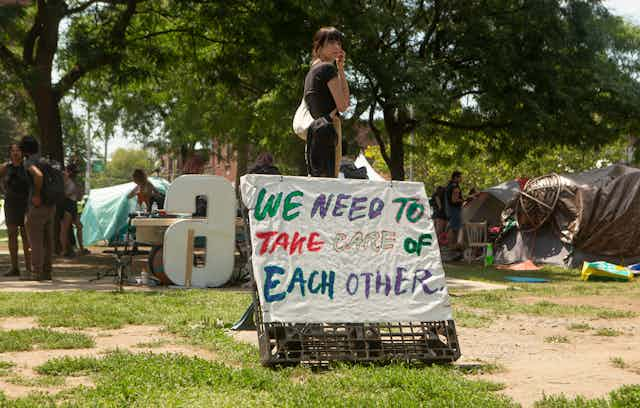Most of us take our belongings for granted. It’s only when we mislay or lose them that we reflect on their value. Our stuff is not only useful, it also holds our memories and identities. It connects us to others.
For most of us, thankfully, permanent loss is unusual. We assume that our belongings will be with us. This is because we have control over them, and the spaces we keep them in, like our homes.
But many people struggling with homelessness don’t have such a secure relationship with their possessions. Homeless people in cities like Vancouver, Toronto, Los Angeles, Washington, D.C, San Francisco and elsewhere are frequently uprooted, brutalized by authorities and have their belongings confiscated.
Incidents that make it into the news are not one-off events. Rather, they’re part of a system that results in homeless people’s belongings constantly being taken from them, legally and illegally, by private and government officials.
Those of us who have not experienced homelessness might not recognize this reality. One of us (Nicholas Blomley) began research on this topic on this assumption. Naively, he asked groups of homeless people to provide stories describing their experience with belongings.
Connie Long, the second author of this article who has experienced homeless, explained that there is no one singular experience of loss. Instead, Connie described a “constant whine, a hum” of dispossession.
Other participants drove this point home. “So it’s not just losing your stuff once, it’s losing your stuff again?” we asked a resident of Surrey, B.C. resident. “Over and over again,” they replied.

The hum
The hum has been studied through our research and the advocacy of others.
Our project interviewed nearly 100 people — either homeless, or in positions of authority relative to homeless people — in Toronto, Vancouver, Surrey and Abbotsford, B.C. We worked with peer-based groups, like Drug War Survivors, in Abbotsford.
The vulnerability that homeless people experience when it comes to their belongings is rarely studied. Even those who regulate homelessness, like police and bylaw officers, don’t appreciate the frequency of loss in what Connie calls the “hum.” Homeless people, conversely, are so used to it that they expect to lose their belongings. As a Toronto respondent told us: “You have to be prepared for losing your stuff every time.”
Most of us don’t experience the hum of loss because of the property rules that protect our belongings in the spaces we live. But homeless people don’t have these protections. Instead, their possessions are controlled by others, like landlords, bylaw officers and shelter or storage operators.
Many of the spaces that homeless people need to access have strict rules when it comes to belongings, such as limits on the amount of things you can bring into shelters or no-pets policies.
Protecting belongings is therefore an everyday challenge for homeless people. Do I store my stuff in one space or multiple locations? Do I lug it all with me to keep it safe, but if so, will that make me and my belongings more visible to police or bylaw officers who might confiscate them? Do I store it with friends or in a storage locker (if I can afford to do so) or hide it? Do I downsize? If so, what do I let go of, and how might this put me at risk later on?

Losing a sense of belonging
Seizing possessions can increase the risks of homelessness. One Surrey participant we spoke to was clear:
“It’s the stuff I need to survive… Without that it’s very, very difficult. When all that stuff gets taken, I wind up sleeping outside with one, or no, blanket whatsoever.”
People who are already vulnerable can become even more so as a result. As an Abbotsford respondent noted, after you lose all your possessions “you are back at the bottom of the barrel. You have to start over again.”
Having our possessions taken from us can impact our sense of self-worth, homeless people told us. One Chilliwack, B.C., participant described her possessions to us as “little trophies of accomplishment.” She explained how hard it is to start over after losing them. To hold on to them is to be able to show to society that one can “be considered a successful human being.”
Importantly, homeless people are traumatized not just by property seizure, but also by the associated devaluation of their right to their possessions. “It’s not so much about the stuff,” noted a Surrey respondent. “It’s about the blatant disrespect.” When her belongings are taken once again, she said, “a little piece of me just dies.”
The hum shapes people’s self-worth. “It is crippling,” a Chilliwack participant told us. “It’s like as an adult you almost feel like a child. It makes me feel like people think I’m less than them, like I don’t deserve it, like I’m undeserving of my own belongings.”

Stopping the hum
Officials often say they provide solutions when they seize homeless people’s belongings, like storing them. But these solutions are often unavailable and impractical, if they exist at all.
Providing storage lockers might be useful. But they do not address the scope of dispossession homeless people face. People’s possessions are at risk in all the spaces they occupy. Singular interventions don’t solve the problem of the hum.
Tangible, workable solutions must be grounded in the expertise of those who experience the hum. We need to listen to homeless people. They can explain the reach and effects of the hum, and offer remedies that take it seriously.
They are called belongings for a reason. The things that belong to us help us belong to society. Belongings matter to everyone. They matter even more to homeless people.
“Our stuff is all we’ve got left,” one participant in Surrey said. “We may be homeless,” noted another in Vancouver, “but we’re not belongingless.”
Connie Long, a member of Drug War Survivors in Abbotsford, B.C., co-authored this article.

